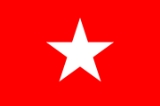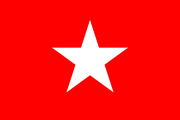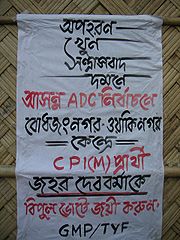
Ganamukti Parishad
Encyclopedia

Bengali language
Bengali or Bangla is an eastern Indo-Aryan language. It is native to the region of eastern South Asia known as Bengal, which comprises present day Bangladesh, the Indian state of West Bengal, and parts of the Indian states of Tripura and Assam. It is written with the Bengali script...
for 'Tripura State Tribal People's Liberation Council') is a leftwing movement working amongst the tribal
Adivasi
Adivasi is an umbrella term for a heterogeneous set of ethnic and tribal groups claimed to be the aboriginal population of India. They comprise a substantial indigenous minority of the population of India...
peoples of Tripura
Tripura
Tripura is a state in North-East India, with an area of . It is the third smallest state of India, according to area. Tripura is surrounded by Bangladesh on the north, south, and west. The Indian states of Assam and Mizoram lie to the east. The capital is Agartala and the main languages spoken are...
, in north-eastern India
India
India , officially the Republic of India , is a country in South Asia. It is the seventh-largest country by geographical area, the second-most populous country with over 1.2 billion people, and the most populous democracy in the world...
.
Origins
During the 1940s the royal house of Tripura tried its best to maintain its political rule over the state. However, monarchy was challenged by movements that were influenced by the Indian National CongressIndian National Congress
The Indian National Congress is one of the two major political parties in India, the other being the Bharatiya Janata Party. It is the largest and one of the oldest democratic political parties in the world. The party's modern liberal platform is largely considered center-left in the Indian...
and the Communist Party of India
Communist Party of India
The Communist Party of India is a national political party in India. In the Indian communist movement, there are different views on exactly when the Indian communist party was founded. The date maintained as the foundation day by CPI is 26 December 1925...
. These associations proposed democratic reforms, but were not with stern resistance from the royal house. In 1946 members of Janamangal Samiti (People’s Welfare Association), Janasiksha Samiti
Tripura Janasiksha Samiti
On 27 December 1945 AD the "Tripura Janasiksha Samiti" came into being at Durgachoudhury Para under the Jirania Block. This organisation was established by some enlightened Tripuri youths with an avowed object to set up schools and spread education among the children of the down-trodden Tripuri's...
(People’s Educational Association), the local cell of the Communist Party and individual leftwingers got together to form the Tripura Rajya Prajamandal (Tripura State Popular Assembly). Prajamandal proposed a form of constitutional monarchy
Constitutional monarchy
Constitutional monarchy is a form of government in which a monarch acts as head of state within the parameters of a constitution, whether it be a written, uncodified or blended constitution...
for the state.
The Prajamandal included both communists and non-communists. In 1948 a ban on the organisation was proposed, on the ground that the organisation was under the influence of communists in East Pakistan
East Pakistan
East Pakistan was a provincial state of Pakistan established in 14 August 1947. The provincial state existed until its declaration of independence on 26 March 1971 as the independent nation of Bangladesh. Pakistan recognized the new nation on 16 December 1971. East Pakistan was created from Bengal...
. This spurred the non-communist leaders of Prajamandal to try to expel the communists. However, the ban was enforced before the expulsion had taken place. Leaders of Prajamandal were arrested, and many cadres went into hiding. By not differentiating between communists and non-communists in repressing Prajamandal, the royal government indirectly contributed to increasing the support for the communist within the organisation. On Independence Day Prajamandal took out a militant manifestation in Agartala. Simultaneously, the movement started activating itself in the struggle for tribal land rights. Following the Partition of India
Partition of India
The Partition of India was the partition of British India on the basis of religious demographics that led to the creation of the sovereign states of the Dominion of Pakistan and the Union of India on 14 and 15...
, a major wave of Bengali
Bengali people
The Bengali people are an ethnic community native to the historic region of Bengal in South Asia. They speak Bengali , which is an Indo-Aryan language of the eastern Indian subcontinent, evolved from the Magadhi Prakrit and Sanskrit languages. In their native language, they are referred to as বাঙালী...
Hindu
Hindu
Hindu refers to an identity associated with the philosophical, religious and cultural systems that are indigenous to the Indian subcontinent. As used in the Constitution of India, the word "Hindu" is also attributed to all persons professing any Indian religion...
s migrated to Tripura from East Pakistan. On the Tripura countryside Bengali money-lenders started to take over agricultural land from indebted tribals. Prajamandal organised resistance, a struggle that radicalized the movement.
On several sites the movement resulted in clashes with the state forces. In October police firing in Bishalgarh killed nine tribals and injured twenty more. The military set up camps in the tribal areas, with the objective of rooting out Prajamandal. The Prajamandal leadership considered that it had no possibility to cope with the increasing repression, and decided to dissolve the association.
In the void that emerged after the disappearance of Prajamandal, tribal leaders founded the Tripura Rajaer Mukti Parishad (Tripura State Liberation Council, generally called Mukti Parishad). Mukti Parishad raised demands of witdrawal of the DIR
Dir
-Acronyms:* Detroit International Riverfront, an area of Detroit, Michigan that borders the Detroit River* Developmental, Individual differences, Relationship-based approach, a developmental intervention to autism developed by Stanley Greenspan and Serena Weider....
and freedom of expression and association. The slogan of the movement was 'Democratic Rights for the People of Tripura'.
Armed struggle
As Tripura was put under military rule in March 1949, the leadership of the Mukti Parishad went underground to escape arrests. In the tribal belts of the state armed resistance was organized by the GMP. Inspired by the advances of the Chinese People's Liberation ArmyPeople's Liberation Army
The People's Liberation Army is the unified military organization of all land, sea, strategic missile and air forces of the People's Republic of China. The PLA was established on August 1, 1927 — celebrated annually as "PLA Day" — as the military arm of the Communist Party of China...
, the Mukti Parishad set up the Shanti Sena (Peace Army), which routed out the troops of the administration from the tribal belt. In the ‘liberated areas’ people’s government was in command, with the Village Committees of GMP managing the everyday affairs. The tribals didn’t have to pay any taxes to the state, nor would they turn to the courts of the state to express their queries. At the same time, a cultural revolution took place within the tribal society as abolition of child marriages, forced labour, excessive alcohol consumption, oppression of women, etc. were outlawed by the GMP.
Entry into mainstream politics
Armed resistance lasted until 1951. Then the strategies changed as a result of the changes in the political climate of the state. The Communist Party had begun to operate over-ground. In the end of 1949 the leaders of GMP had joined CPI. Now the struggle of the GMP was to be taken overground, in cooperation with CPI. In the first parliamentary elections of India in 1952 both seats of the Lok SabhaLok Sabha
The Lok Sabha or House of the People is the lower house of the Parliament of India. Members of the Lok Sabha are elected by direct election under universal adult suffrage. As of 2009, there have been fifteen Lok Sabhas elected by the people of India...
(2nd chamber of the Indian parliament) were won by the CPI. Both of the elected MPs, Biren Dutta and Dasarth Deb, were stalwarths of the GMP. Deb, the president of GMP, was at the time of election still considered as a guerrilla leader on the run by the police. The cases against him were not dropped until he was pardoned by the Prime Minister Jawaharlal Nehru
Jawaharlal Nehru
Jawaharlal Nehru , often referred to with the epithet of Panditji, was an Indian statesman who became the first Prime Minister of independent India and became noted for his “neutralist” policies in foreign affairs. He was also one of the principal leaders of India’s independence movement in the...
himself after having reached the parliament premises incognito for his first session.
1967 conference

Bengal
Bengal is a historical and geographical region in the northeast region of the Indian Subcontinent at the apex of the Bay of Bengal. Today, it is mainly divided between the sovereign land of People's Republic of Bangladesh and the Indian state of West Bengal, although some regions of the previous...
i). After the end of the armed struggle, an intense debate surged within the CPI concerning the future role of the GMP. Some considered that the GMP, whose membership was overwhelmingly agrarian, should be integrated into the peasant mass organization of the party, AIKS, and that tribal and Bengali peasants should fight together since their class interests were the same. Other, such as Deb, considered that the tribals were not merely peasants but also constituted a separate sub-national entity and that the GMP should be a tribal organization articulating the sub-nationalist consciousness of the tribal community.
In the beginning of the 1960s CPI suffered a severe internal division. The party was split into two camps on issues such as the relationship to the Congress party
Indian National Congress
The Indian National Congress is one of the two major political parties in India, the other being the Bharatiya Janata Party. It is the largest and one of the oldest democratic political parties in the world. The party's modern liberal platform is largely considered center-left in the Indian...
and the Sino-Soviet polemic. In 1964 the split was a fact, as two separate party congresses were held, one by CPI and the other by Communist Party of India (Marxist)
Communist Party of India (Marxist)
The Communist Party of India is a political party in India. It has a strong presence in the states of Kerala, West Bengal and Tripura. As of 2011, CPI is leading the state government in Tripura. It leads the Left Front coalition of leftist parties in various states and the national parliament of...
. The split also came to divide the Tripura unit of the CPI, with the CPI(M) soon having outmanovered the CPI in Tripura. Initially both factions agreed that the GMP ought to stay intact and that it would be spared from the split for the sake of unity of the mass organization movement, but soon competition over control over the organization started. At the GMP conference of 1967 the split had also reached the GMP, ending in the victory for the CPI(M) and its leader within the GMP, Deb, who were able to gather the support of the broad majority of the organization. At the same conference the GMP was re-christened as the Upajati (i.e., Tribal) Ganamukti Parishad. Subsequently, non-tribals were no longer able to obtain GMP membership. Thus Deb’s thesis that tribals constituted as separate subnationalist entity and needed a mass organization of their own had been implemented in the organizational practice.
Following the 1967 conference CPI formed its own Ganamukti Parishad, led by Aghore Debbarma. It has not played any major political role since its foundation.
ATPLO merger
In 1983 the All Tripura Peoples Liberation Organization of Binanda Jamatya gave up their arms and were integrated into the Ganamukti Parishad. ATPLO had surged as a splinter-group of the Tripura National VolunteersTripura National Volunteers
Tripura National Volunteers was a Tripuri nationalist militant group in the Tripura region of India that launched an armed struggle in the early 1980s to separate Tripura from India. TNV was led by Bijoy Kumar Hrangkhawl.TNV surrendered in 1988 and integrated themselves into a political party...
, and a turf war between the TNV soon turned into a bloody fight. In the end, ATPLO found no other viable solution than to align with their former enemies and thus merge into GMP.
The organisation today
Today the GMP is affiliated with the All India Kisan SabhaAll India Kisan Sabha (Ashoka Road)
All India Kisan Sabha , is the peasants front of Communist Party of India , and works for farmers rights and anti-feudal movement in India, which traces its origin to All India Kisan Sabha founded in 1936.It is sometimes referred to as All India Kisan Sabha , to distinguish it from the AIKS of...
, the peasant mass-organization of the Communist Party of India (Marxist)
Communist Party of India (Marxist)
The Communist Party of India is a political party in India. It has a strong presence in the states of Kerala, West Bengal and Tripura. As of 2011, CPI is leading the state government in Tripura. It leads the Left Front coalition of leftist parties in various states and the national parliament of...
(CPI(M)). GMP does, however, maintain its own organizational character as an entirely tribal organization. Similarly, as the GMP is an affiliate to the AIKS, the Tribal Youth Federation
Tribal Youth Federation
Tribal Youth Federation is an organization affiliated to Democratic Youth Federation of India in Tripura. TYF organizes youth from the tribal populations of the state. TYF has a separate central committee and publishes Bini Kharad...
is affiliated to the Democratic Youth Federation of India
Democratic Youth Federation of India
Democratic Youth Federation of India , is an Indian left-wing youth organization founded in 1980. DYFI, as it is popularly known, is politically linked to the Communist Party of India .The current general secretary of DYFI is Tapas Sinha and the president is P...
and the Tribal Students Union is affiliated to the Students Federation of India
Students Federation of India
Students Federation of India is one of the major student organisations in India. SFI is politically linked to the Communist Party of India . Founded in 1970, it claimed a membership strength of nearly 4.2 million school and university students as of 2010.SFI is currently led at the All India level...
. However at the same time as these organizations belong to different all India structures, they are organizationally interlinked. The general secretary and president of TYF are by tradition elected as members of the secretariat of the GMP. The GMP, TYF and TSU use other flags, symbols and publications than their all India bodies. The leadership of these three organizations are referred to as Central Committees, whereas the state leaderships of the AIKS, DYFI and SFI are referred to as State Committees.
By 2000 it claimed a membership of 70 000. It president is Aghore Debbarma and its general secretary is Lok Sabha
Lok Sabha
The Lok Sabha or House of the People is the lower house of the Parliament of India. Members of the Lok Sabha are elected by direct election under universal adult suffrage. As of 2009, there have been fifteen Lok Sabhas elected by the people of India...
MP Babujan Riang.
External links
- Dasarath Deb, 1916-1998, article in Frontline
- Article on the 17th central conference of GMP, in People's Democracy

